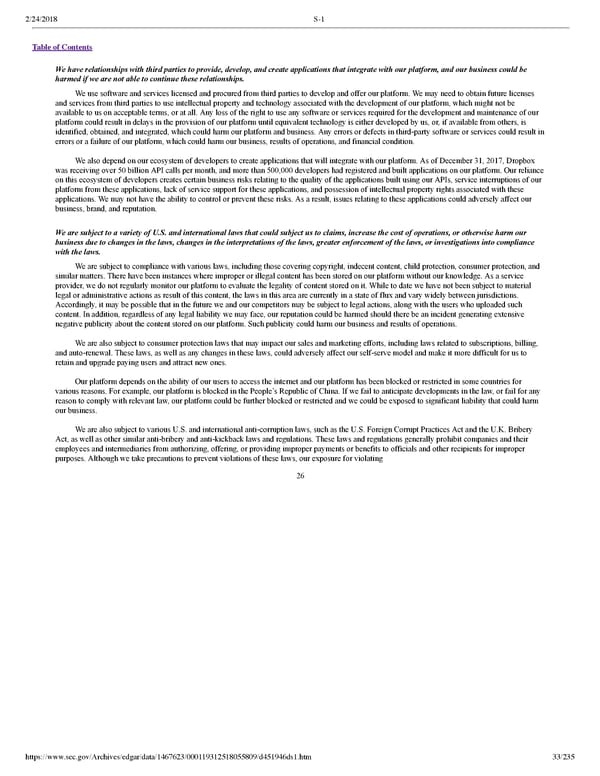2/24/2018 S-1 Table of Contents We have relationships with third parties to provide, develop, and create applications that integrate with our platform, and our business could be harmed if we are not able to continue these relationships. We use software and services licensed and procured from third parties to develop and offer our platform. We may need to obtain future licenses and services from third parties to use intellectual property and technology associated with the development of our platform, which might not be available to us on acceptable terms, or at all. Any loss of the right to use any software or services required for the development and maintenance of our platform could result in delays in the provision of our platform until equivalent technology is either developed by us, or, if available from others, is identified, obtained, and integrated, which could harm our platform and business. Any errors or defects in thirdparty software or services could result in errors or a failure of our platform, which could harm our business, results of operations, and financial condition. We also depend on our ecosystem of developers to create applications that will integrate with our platform. As of December 31, 2017, Dropbox was receiving over 50 billion API calls per month, and more than 500,000 developers had registered and built applications on our platform. Our reliance on this ecosystem of developers creates certain business risks relating to the quality of the applications built using our APIs, service interruptions of our platform from these applications, lack of service support for these applications, and possession of intellectual property rights associated with these applications. We may not have the ability to control or prevent these risks. As a result, issues relating to these applications could adversely affect our business, brand, and reputation. We are subject to a variety of U.S. and international laws that could subject us to claims, increase the cost of operations, or otherwise harm our business due to changes in the laws, changes in the interpretations of the laws, greater enforcement of the laws, or investigations into compliance with the laws. We are subject to compliance with various laws, including those covering copyright, indecent content, child protection, consumer protection, and similar matters. There have been instances where improper or illegal content has been stored on our platform without our knowledge. As a service provider, we do not regularly monitor our platform to evaluate the legality of content stored on it. While to date we have not been subject to material legal or administrative actions as result of this content, the laws in this area are currently in a state of flux and vary widely between jurisdictions. Accordingly, it may be possible that in the future we and our competitors may be subject to legal actions, along with the users who uploaded such content. In addition, regardless of any legal liability we may face, our reputation could be harmed should there be an incident generating extensive negative publicity about the content stored on our platform. Such publicity could harm our business and results of operations. We are also subject to consumer protection laws that may impact our sales and marketing efforts, including laws related to subscriptions, billing, and autorenewal. These laws, as well as any changes in these laws, could adversely affect our selfserve model and make it more difficult for us to retain and upgrade paying users and attract new ones. Our platform depends on the ability of our users to access the internet and our platform has been blocked or restricted in some countries for various reasons. For example, our platform is blocked in the People’s Republic of China. If we fail to anticipate developments in the law, or fail for any reason to comply with relevant law, our platform could be further blocked or restricted and we could be exposed to significant liability that could harm our business. We are also subject to various U.S. and international anticorruption laws, such as the U.S. Foreign Corrupt Practices Act and the U.K. Bribery Act, as well as other similar antibribery and antikickback laws and regulations. These laws and regulations generally prohibit companies and their employees and intermediaries from authorizing, offering, or providing improper payments or benefits to officials and other recipients for improper purposes. Although we take precautions to prevent violations of these laws, our exposure for violating 26 https://www.sec.gov/Archives/edgar/data/1467623/000119312518055809/d451946ds1.htm 33/235
 Dropbox S-1 | Interactive Prospectus Page 32 Page 34
Dropbox S-1 | Interactive Prospectus Page 32 Page 34